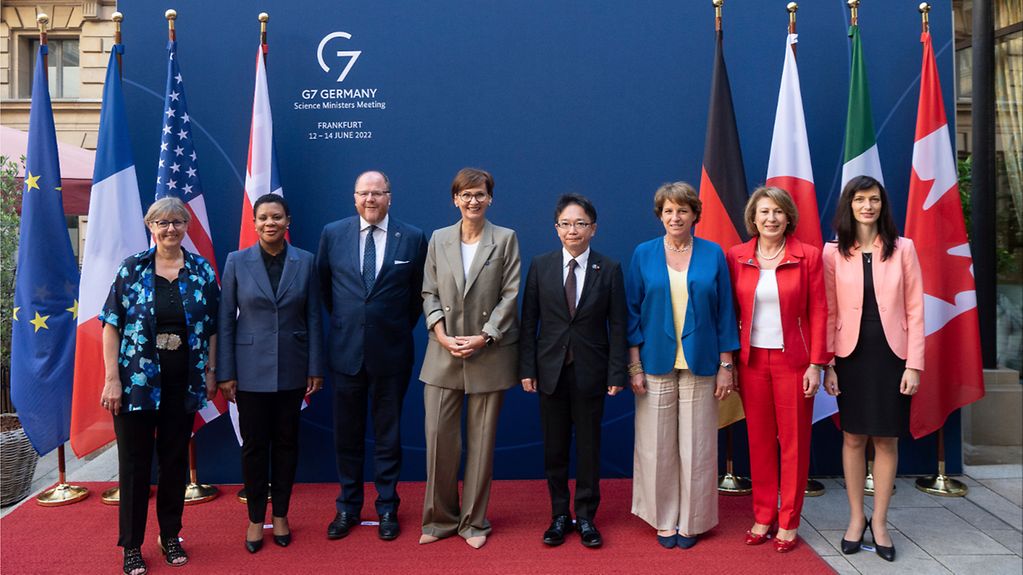Meeting of the G7 Science Ministers
Keeping climate change in check, drawing on research to mitigate the impact on COVID-19 and boosting scientific freedom: these are the priorities at the meeting of the G7 Science Ministers in Frankfurt. Joint efforts in science and research were the key to tackling the challenges that lie ahead, said the Federal Research Minister at the G7 Ministerial Meeting.

Bettina Stark-Watzinger, Federal Minister of Education and Research, welcomed her G7 colleagues at the Ministerial Meeting in Frankfurt.
Photo: picture alliance/dpa
“Science and research are crucial to our future: without research, there can be no progress and no innovation,” stressed Federal Research Minister Bettina Stark-Watzinger in her opening statement at the meeting of G7 Science Ministers in Frankfurt. The world was currently facing enormous challenges, said Stark-Watzinger, which was why research efforts need to be boosted – guided by the G7 Presidency’s motto “Progress towards an equitable world”.
Germany holds the G7 Presidency this year. Under this Presidency, Science Ministers are meeting to share ideas in Frankfurt am Main from 12 to 14 June 2022. In addition to the ministers from the G7 countries, the Ukrainian Minister of Science, Serhiy Shkarlet, was also invited to attend.
Solidarity with Ukraine
The G7 Science Ministers once again strongly condemned Russia’s war of aggression against Ukraine, assuring Ukraine of their full solidarity. According to the Federal Minister of Education and Research, the aim is to further strengthen research cooperation with Ukraine and offer prospects for all refugees, students and researchers who were currently here.
At the same time, she said, it was important to provide protection for those courageous scientists opposing the regime and the war in Russia. “It is vital for us to send out a clear signal here today,” said Federal Research Minister Stark-Watzinger.
Germany has set itself three priorities for the G7 Science Meeting which are set out in a joint declaration agreed on by the G7 countries.
Enhanced protection for freedom, integrity and security in science and research
The freedom of science and research faced acute risks in many countries of the world, said the Federal Research Minister, adding that there were increasing attempts by governments and non-state actors to intervene in science. For this reason, the G7 countries condemned restrictions on research freedom worldwide, she said. “We do not tolerate violations and abuse of human rights and we will take action in response to this if necessary,” said Federal Research Minister Stark-Watzinger.
Advancing research to combat climate change
Keeping climate change in check is of huge importance to the future of all people, including future generations, which is why the G7 countries are seeking to push ahead with research to combat the climate crisis. As the Federal Minister said: “Our commitments stand: we aim to meet the 1.5 degree target set down in the Paris Agreement. To do this we need to take swift and resolute action together to reduce greenhouse gas emissions.”
“This alone will not be enough, however, which is why we need to actively remove carbon dioxide from the atmosphere, too,” said Stark-Watzinger. This was a fascinating new area of activity that would require the innovative strength of the G7, she said.
The decline in biodiversity was another problem that was closely linked to climate change, said the Federal Research Minister. The G7 countries have attached particular importance to marine and ocean biodiversity. “We’re looking to join forces to assess and tackle both the marine biodiversity crisis and the global climate crisis, thereby generating effective momentum in how we adapt to climate change,” said Stark-Watzinger.
Expansion of research into post-COVID syndrome
It remains the case that very little is known about why some people develop long-term complications after a COVID-19 infection, so well-founded scientific knowledge is much in demand here. This is why the G7 countries plan to support and advance international research into post-COVID syndrome. “We aim to create lasting opportunities for research in this field,” says Stark-Watzinger. This research was an important part of the pandemic response that ensured quality of life, she concluded.
Close cooperation in science and research
The meeting of G7 Science Ministers clearly reflected one thing in particular: “Joint efforts in science and research are the key to tackling the challenges ahead. Only by using science and research can we be successful here,” stressed Federal Research Minister Stark-Watzinger in her closing statement. The results of the meeting will feed into deliberations at the G7 Summit, which is due to take place in two weeks’ time.
The “Group of G7 countries” includes Germany, France, the UK, Italy, Japan, Canada and the USA. The European Union is also represented at all G7 meetings. The Presidency rotates between members on an annual basis. Germany holds the Presidency in 2022. The 2022 G7 Summit will take place from 26 to 28 June 2022 at Schloss Elmau in the Bavarian Alps. See the website for details.